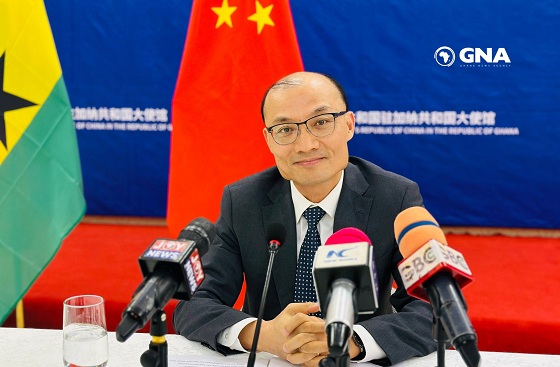Tong Defa, Chinese Ambassador to Ghana, says Beijing does not condone the illegal activities of its citizens anywhere in the world, including Ghana.
He said the Chinese government, therefore, supported Ghana’s efforts to curb illegal mining (galamsey) and to punish offenders accordingly.
Responding to a question at a media briefing in Accra, Thursday, on the deportation of Chinese nationals arrested for illegal mining, Ambassador Tong emphasised Beijing’s zero-tolerance policy and noted that China had instituted stringent measures to deter its nationals from engaging in such acts.
“The Chinese government discourages our citizens from taking part in any illegal activities, not only in Ghana but in any country around the world,” he said.
“We have strict rules. Anyone involved in illegal mining will not be issued a passport and will not be allowed to return to Ghana. They will also face punishment under Chinese law.”
He, however, said it was unjust to blame illegal mining solely on Chinese nationals, pointing out that galamsey predated their involvement and often occurred with the complicity of Ghanaian hosts.
“Several foreign nationals are involved in galamsey. It is unfair to synonymise it with Chinese,” he stated.
Ambassador Tong urged the Ghanaian media to report the issue factually and objectively to foster long-term solutions.
He said Chinese law enforcement continued to collaborate with Ghanaian authorities to repatriate illegal miners and ensure they did not re-enter the country.
Deportation, he explained, had proven to be a more effective bilateral arrangement, as some offenders were likely to escape while on bail when being prosecuted.
He called for a more holistic approach to small-scale mining regulation, noting that millions of Ghanaians depended on the sector.
“We need a long-term policy that balances economic livelihoods with environmental protection. I don’t believe small-scale mining can be eliminated entirely, but it can be better regulated,” he added.
According to the Ambassador, a sustainable solution requires collaboration among government, local authorities, mining communities and international partners.
He underscored the positive contributions of legally operating Chinese businesses, such as Chifeng Gold in the Western Region, which he described as a model of responsible investment.
“They only have five Chinese managers; the rest of the workforce is Ghanaian. They also support farmers by planting oil palm and employing over 400 locals,” he said.
He also praised KEDA Ceramics, a Chinese-owned factory, for employing over 4,000 Ghanaians directly and benefitting about 15,000 people through its supply chain.
“It was even recognised with a Ghanaian business award this year,” he added.
Ambassador Tong appealed to the media to also highlight such success stories to reflect the full scope of Ghana–China relations.
“Our relationship is driven by solidarity. The Chinese Embassy is always ready to work together on solutions that benefit both countries.
“The media can play a powerful role in helping us tell the full story,” he urged.
GNA





